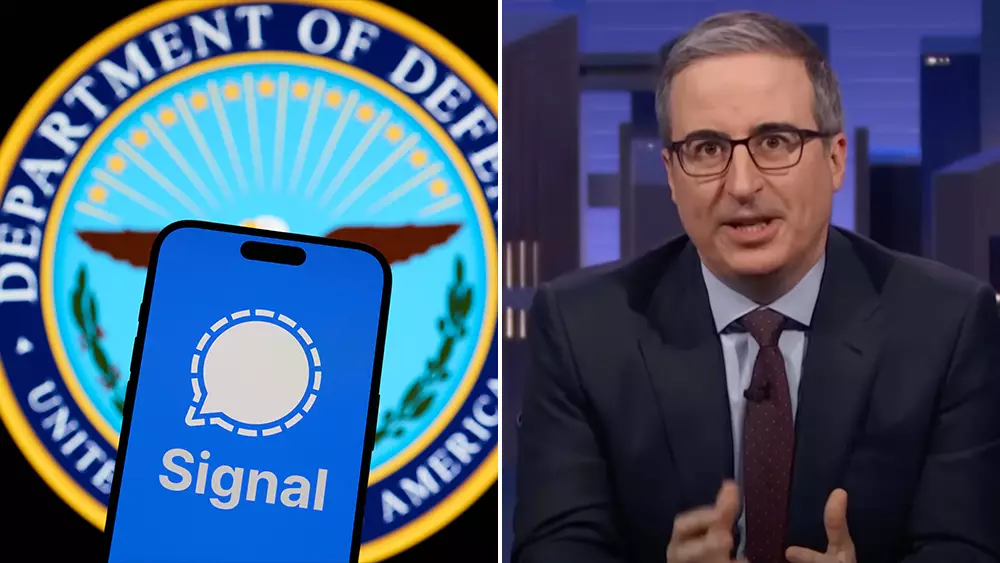Political discourse in the modern age often dances dangerously close to the bizarre, turning serious issues into a spectacle of absurdity. This phenomenon was exemplified during a recent episode of “Last Week Tonight,” where host John Oliver unearthed the laughable incompetence of the Trump administration amid a significant leak concerning their internal communications. The leak highlighted not just the administration’s questionable decision-making but also their alarmingly unserious approach to governance—emojis being the prime example.
As Oliver pointed out, the very emojis selected by high-ranking officials were insipidly inappropriate for the gravity of the situations they were supposed to address. This revelation, detailed in The Atlantic as “The Trump Administration Accidentally Texted Me Its War Plans,” serves as a testament to the disarray and incomprehensibility that has come to define recent political eras. Rather than leveraging the gravity of leadership to communicate effectively, the leaders opted for a visual language better suited for a jovial group chat than a serious discussion about national security.
The Symbolism of Emojis in High-stakes Communications
The use of emojis by National Security Adviser Michael Waltz and his colleagues highlights a trend that has infiltrated the highest echelons of power: a lack of seriousness about the implications of their decisions. Emoticons like the fiery flame, the fist, and the prayer hands, when deployed amidst a crisis involving drone strikes and military action, strip the conversation of its dignity. Oliver’s comparison, suggesting that choosing the right emoji after a tragedy is like deciding which Minion meme to send posthumously, aptly underscores the juvenile and grotesque nature of such communications.
What does it mean when leadership goes so far as to trivialize crisis management through digital illustrations? It throws into stark relief the disconnect between the gravity of their duties and their actual demeanor, allowing one to question the competence and seriousness of those in power. When these leaders engage in what seems like a cosplay of governance rather than taking real, actionable steps, it breeds a culture where the surreal replaces the substantive.
Incompetence in Action: The Shadows of Deportation Policies
But the conversation about incompetence doesn’t stop shy of emoji. Addressing poignant current events, Oliver called attention to the administration’s treatment of undocumented migrants, particularly Venezuelans subjected to mass deportations, which he described as emblematic of the cruelty stemming from systemic incompetence. Here, we see not just absurdity, but actual human ramifications that derive from mismanagement and ruthless policy practices.
Oliver pointed to the alarming visuals of Secretary Kristi Noem standing amidst caged inmates in an advertisement for those mass deportations, a backdrop evoking troubling historical precedents. The choice to showcase prisoners this way is not merely poor taste; it is a glaring indicator of how disconnected the administration is from the societal repercussions of their policies. Such decisions by leaders, parading the grim realities of incarceration while discussing human rights, lay bare the sadistic irony in their actions.
While the pushback against these policies grows louder, the initial damage signals an administration running on the fumes of incompetence, where cruelty is prioritized over compassion. The emotional toll inflicted on those living in fear—a fear intensified by being painted as synonymous with delinquency for mere physical markings like tattoos—illustrates a failure to uphold justice and humanity.
A Culture in Crisis
As this administration’s pattern of behavior unfolds, it reveals a broader cultural crisis within political leadership. With recent events, it has become painfully clear that the threshold for debates surrounding ethics, integrity, and competence has been lowered. Consequently, those in leadership roles often appear to lack not only the necessary skills for governance but also the moral compass expected of their positions.
The illustrations painted by Oliver serve as a reminder that we are in a time when seriousness in politics is often eclipsed by a penchant for folly. The political landscape, once considered a domain governed by decorum and high stakes risks, feels more akin to a chaotic social media feed, where leaders opt for quick replies and fist emojis rather than serious discussions steeped in context and grave consequences. In a world fraught with complexity, this trivialization of communication marks a perilous point—a slippery slope where each tweet and emoji may add another layer to the collective absurdity we’ve collectively normalized.

